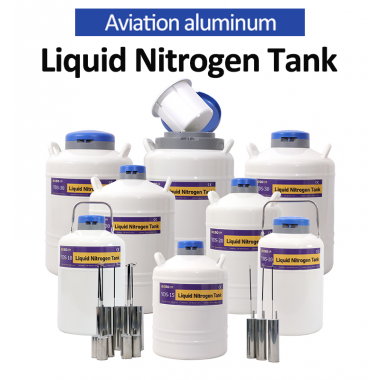In the fields of biological sample repository, medical cold storage, animal frozen sperm, vaccine storage and scientific research experiments, the sealing performance of liquid nitrogen tanks is the core to ensure temperature stability and safe storage of samples. Long-term cryopreservation is achieved through a unique vacuum insulation design, the key technologies of which include double chamber design, neck tube design and insulation material filling. Today, we will discuss in depth the hermeticity of liquid nitrogen tanks and how it ensures that the internal liquid nitrogen is isolated from the external environment and maintains its ultra-low temperature status.
1. Vacuuming inside and outside the tank
The liquid nitrogen tank has a double-layer design of inner and outer gallbladder, with the inner gallbladder storing liquid nitrogen, and the vacuum sandwich between the outer gallbladder and the inner gallbladder effectively blocking heat conduction, which significantly improves the heat preservation performance and airtightness. The high-strength glass fiber reinforced plastic (FRP) neck tube at the connection between the inner and outer chambers, with low thermal conductivity and small caliber, further reduces the evaporation of liquid nitrogen, ensures the sealing and prevents gas exchange. This is the seal between the inner and outer double gallons.
2. Adiabatic material wrapping to maintain low internal temperature
Multiple layers of insulating materials are filled to provide additional insulation and sealing protection for the inner liner, reducing the influence of the external environment on the liquid nitrogen inside the tank and improving the safety of sample storage.
3. Insulated neck plugs to isolate heat and guard the safety defense.
Do a good job of sealing between the two chambers, insulating and filling between the two chambers, and the important tank opening.
The mouth of the tank is the entrance and exit of the samples and liquid nitrogen, but also heat into the liquid nitrogen tank must pass through the mouth, in order to organize the heat to enter the organization in a big way, the manufacturer for it to add a plug, the material is polyurethane foam, lightweight but insulated, and can be dustproof. Importantly, it is the groove design, fixed sample rod while leaving the gasification of liquid nitrogen excluded from the gap, keep a good safety pass, to avoid the accumulation of nitrogen to form pressure triggered by the risk of explosion.
These are the seals belonging to the liquid nitrogen tank, exclusive design is different from other metal containers. In order to consider the long-term use of the container, it is recommended to regularly check the tank, vacuum port, observe the liquid nitrogen consumption, maintain its efficient operation and sealing performance, to ensure that the internal liquid nitrogen does not exchange gas with the external environment, to protect your samples safe and secure.









